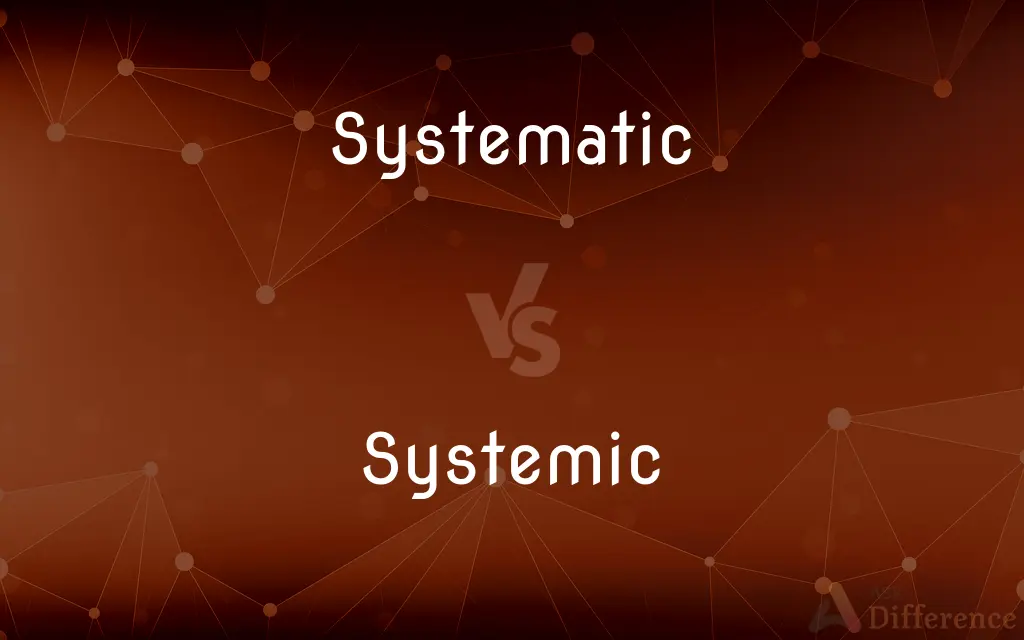Systematic vs. Systemic — What's the Difference?
By Fiza Rafique & Maham Liaqat — Updated on March 20, 2024
Systematic refers to a process or method being carried out using a planned, orderly procedure, while systemic denotes something that is widespread, affecting an entire system, like a body or organization.

Difference Between Systematic and Systemic
Table of Contents
ADVERTISEMENT
Key Differences
Systematic and systemic are terms often used in various fields such as science, medicine, and social sciences, but they address different concepts. Conversely, systemic refers to something that is spread throughout, affecting an entire system. In medicine, a systemic disease affects the whole body, rather than a single organ or part.
While systematic efforts can be designed to address systemic problems, the nature of these efforts and problems differ significantly. A systematic approach might involve organized steps to identify and address systemic issues, highlighting how these terms can be related but are not interchangeable.
Understanding the distinction is crucial, as it shapes how problems are diagnosed and addressed. For example, addressing a systemic issue like inequality requires more than systematic changes to policies; it demands a comprehensive shift in the underlying structures and attitudes permeating the system.
Comparison Chart
Definition
Pertaining to or involving a system, method, or plan; methodical in procedure or plan.
Pertaining to or affecting the entire body or an entire system or organization.
Focus
The process or method being orderly and planned.
The impact or presence throughout an entire system.
ADVERTISEMENT
Usage Context
Research methods, procedures, operations.
Diseases, issues affecting the whole of a system.
Examples
Systematic review, systematic planning.
Systemic disease, systemic racism.
Outcome
Ensures consistency and thoroughness.
Indicates a widespread or fundamental issue.
Compare with Definitions
Systematic
Carried out using step-by-step procedures.
A systematic approach to data analysis ensures accuracy.
Systemic
Reflecting a condition that affects an organization or system broadly.
The company faces systemic challenges that affect its growth.
Systematic
Implemented according to a system, plan, or organized method.
Systematic investment plans offer a disciplined approach to saving.
Systemic
Embedded within and spread throughout an entire system.
Systemic bias in institutions can hinder progress towards equality.
Systematic
Involving or affecting a system as a whole.
Systematic planning is crucial for project management.
Systemic
Relating to or affecting the entire body or an entire system.
Systemic diseases require comprehensive treatment strategies.
Systematic
Organized and methodical in arrangement or functioning.
Her systematic organization of the event made it a success.
Systemic
Involving sectors or aspects that are widespread within a system.
Systemic reforms in education can transform society.
Systematic
Pertaining to the system of classification.
Botanists use systematic methods to classify plants.
Systemic
Pertaining to the whole system rather than just parts.
Systemic change is needed to combat climate change effectively.
Systematic
Done or acting according to a fixed plan or system; methodical
A systematic search of the whole city
Systemic
Relating to a system, especially as opposed to a particular part
The disease is localized rather than systemic
Systematic
Characterized by, based on, or constituting a system
Systematic thought.
Systemic
Denoting the part of the circulatory system concerned with the transport of oxygen to and carbon dioxide from the body in general, especially as distinct from the pulmonary part concerned with the transport of oxygen from and carbon dioxide to the lungs.
Systematic
Working or done in a step-by-step manner; methodical
A systematic worker.
A systematic approach.
Systemic
(of an insecticide, fungicide, or similar substance) entering the plant via the roots or shoots and passing through the tissues.
Systematic
Carried out according to a planned, ordered procedure.
Systemic
Of or relating to systems or a system.
Systematic
(by extension) Methodical, regular and orderly.
Systemic
Relating to or affecting the entire body or an entire organism
Systemic symptoms.
A systemic poison.
Systematic
Treating an object as a system or coherent whole.
The systematic study of religious beliefs
Systemic
Relating to or affecting a particular body system, especially the nervous system
A systemic lesion.
Systematic
(taxonomy) Of or relating to taxonomic classification.
Systemic
(Physiology) Of or relating to systemic circulation.
Systematic
(chemistry) Of, relating to, or in accordance with generally recognized conventions for the naming of chemicals.
Systemic
Embedded within and spread throughout and affecting a whole system, group, body, economy, market, or society.
Systematic
Of, relating to, or being a system.
Systemic
(physiology) Pertaining to an entire organism.
Systematic
(colloquial) systematically
Systemic
Affecting an entire system;
A systemic poison
Systematic
Of or pertaining to system; consisting in system; methodical; formed with regular connection and adaptation or subordination of parts to each other, and to the design of the whole; as, a systematic arrangement of plants or animals; a systematic course of study.
Now we deal much in essays, and unreasonably despise systematical learning; whereas our fathers had a just value for regularity and systems.
A representation of phenomena, in order to answer the purposes of science, must be systematic.
Systematic
Proceeding according to system, or regular method; as, a systematic writer; systematic benevolence.
Systematic
Pertaining to the system of the world; cosmical.
These ends may be called cosmical, or systematical.
Systematic
Affecting successively the different parts of the system or set of nervous fibres; as, systematic degeneration.
Systematic
Characterized by order and planning;
The investigation was very systematic
A systematic administrator
Systematic
Not haphazard;
A series of orderly actions at regular hours
Common Curiosities
How do systematic reviews differ from other types of reviews?
Systematic reviews follow a structured, comprehensive protocol to evaluate all relevant research on a specific question, minimizing bias.
What is an example of a systemic issue?
Systemic racism, where racial bias is embedded within societal institutions and structures, is an example.
What does systematic mean?
Systematic means involving or characterized by a methodical and orderly approach or system.
What role do systematic methods play in research?
They ensure that research is conducted in a consistent, unbiased, and thorough manner, enhancing reliability and validity.
Can a solution be both systematic and systemic?
Yes, solutions can be systematic in their methodical approach while aiming to address systemic issues affecting an entire system.
Why is it important to distinguish between systematic and systemic?
Distinguishing between them is crucial for accurately identifying the nature of problems or approaches, whether they pertain to methodical processes or widespread impacts.
How does systemic change differ from other changes?
Systemic change involves fundamental shifts in the underlying structures and processes of a system, affecting it as a whole.
What makes a disease systemic?
A disease is systemic when it affects the entire body or multiple organ systems rather than being localized to one area.
How can systemic issues be identified?
Identifying systemic issues often requires analyzing patterns, disparities, and outcomes across the entire system to understand underlying causes.
Can systemic problems be solved with systematic approaches?
While systematic approaches can help address systemic problems, they often require deeper changes to the system's foundational structures.
Share Your Discovery

Previous Comparison
Humanness vs. Humanity
Next Comparison
Sausage vs. ChipolataAuthor Spotlight
Written by
Fiza RafiqueFiza Rafique is a skilled content writer at AskDifference.com, where she meticulously refines and enhances written pieces. Drawing from her vast editorial expertise, Fiza ensures clarity, accuracy, and precision in every article. Passionate about language, she continually seeks to elevate the quality of content for readers worldwide.
Co-written by
Maham Liaqat













































